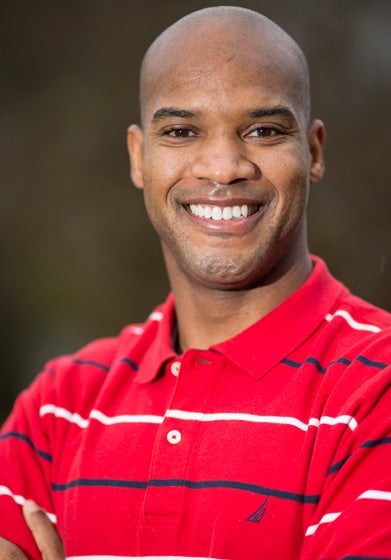Student: Antione Barry
When U.S. Army Maj. Antione Barry landed in a hospital in Texas, medical records were the last things on his mind. That is until the doctors told him they were missing.
“The individuals could not see the records through the electronic system,” said Barry. “So basically it was a re-evaluation starting from scratch.”
Three years passed before Barry’s medical records caught up to him –this time in a hospital in South Korea. Now, he is seeking to improve health care record keeping systems by pursuing a master’s degree in health informatics and information management at East Carolina University.
Barry graduated with honors from Augusta State University in 2004, where he received a bachelor’s degree in criminal justice and sociology. He has also received a master of arts in management and leadership from Webster University.
For 12 years, Barry has served in the United States Army as a Medical Service Corps officer and a medical platoon leader, among other titles. His military experience spans two tours to South Korea and deployment to Iraq and Afghanistan.
“From a military standpoint, one of the things I see [is that] everything is guided by documented information,” said Barry. “Far too often, as I experienced when I was in Iraq, you have people who are injured in one particular area;however, when they go to another facility, they would have issues with the provider because their medical info was not there or no one could see their medical information.”
Those who transfer out of the military experience the same issues, said Barry. Veteran information may not be available at the U.S Department of Federal Affairs. Finding a way to retain medical information is one technical issue that Barry hopes to solve.
Barry wants people to understand the value of medical information. “A lot of people don’t think too much of it,” he said. “It’s very important that you do think of it because down the road you may need assistance, but in order to get that assistance you have to have documentation of what happened.”
He hopes to share his knowledge not only with service members, but with civilians as well. “Knowing your information from a civilian doctor is just as important as important as in the military,” said Barry. “You should keep track of that info.”
Barry expects to graduate in May.
Why did you choose ECU?
The military has opportunities for service members … to learn more about managing health information. The military told me to choose a school that deals with health information, and that’s what brought me to East Carolina University.
What would you like to do with your degree in the future?
I’m trying to use the skills learned at ECU to enhance the capabilities of the military (and) what they have currently as far as managing health information and writing policies and procedures in accordance with federal regulation. Once I get out of the military, I would like to translate that over to the civilian sector or go to the Department of Veteran’s Affairs with skills that can be utilized.
Statistics
College: College of Allied Health Sciences
Major: M.S., Health Informatics and Information Management
Age: 37
Classification/Year: Graduate student (final semester Spring 2016)
Hometown: Augusta, Georgia
Clubs & Organizations: Student Health Information Management Association
Hobbies & Interests: Taking cruises
Favorites
Favorite place to eat: Buffalo Wild Wings
Favorite Movie: Bond movies
Favorite website: Google
Favorite place on campus: Student Recreation Center
Favorite hangout: Home with family
Motivations
Professor who influenced you the most: Dr. Ray Hylock
The one thing you cannot live without: Chocolate
Role Model: My wife
Dream Job: Cruise director
Your words to live by: Treat others as you want to be treated.

